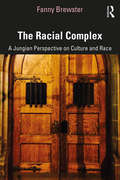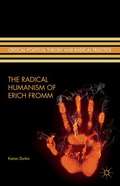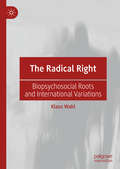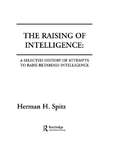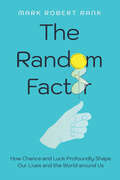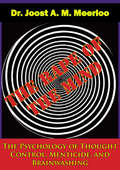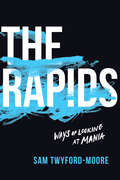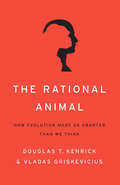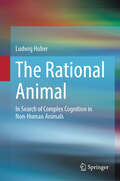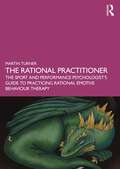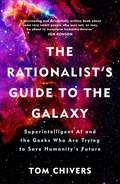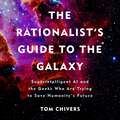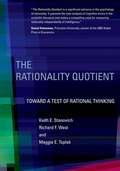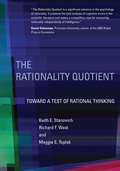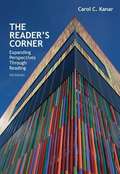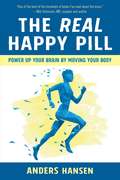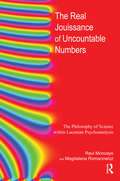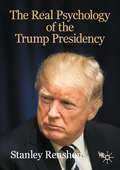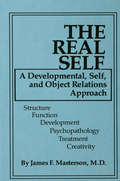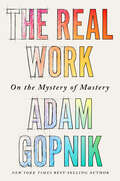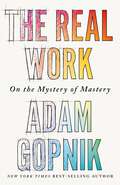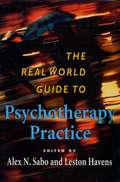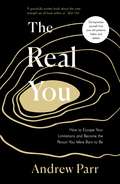- Table View
- List View
The Racial Complex: A Jungian Perspective on Culture and Race
by Fanny BrewsterIn The Racial Complex: A Jungian Perspective on Culture and Race, Fanny Brewster revisits and examines Jung’s classical writing on the theory of complexes, relating it directly to race in modern society. In this groundbreaking exploration, Brewster deepens Jung’s minimalist writing regarding the cultural complexes of American blacks and whites by identifying and re-defining a psychological complex related to ethnicity. Original and insightful, this book provides a close reading of Jung’s complexes theory with an Africanist perspective on raciality and white/black racial relationships. Brewster explores how racial complexes influence personality development, cultural behavior and social and political status, and how they impact contemporary American racial relations. She also investigates aspects of the racial complex including archetypal shadow as core, constellations and their expression, and cultural trauma in the African diaspora. The book concludes with a discussion of racial complexes as a continuous psychological state and how to move towards personal, cultural and collective healing. Analyzing Jung’s work with a renewed lens, and providing fresh comparisons to other literature and films, including Get Out, Brewster extends Jung’s work to become more inclusive of culture and ethnicity, addressing issues which have been left previously unexamined in psychoanalytic thought. Due to its interdisciplinary nature, this book will be of great importance to academics and students of Jungian and post-Jungian studies, sociology, politics, history of race, African American studies and African diaspora studies. As this book discusses Jung’s complexes theory in a new light, it will be of immense interest to Jungian analysts and analytical psychologists in practice and in training.
The Radical Humanism of Erich Fromm
by Kieran DurkinThis book argues that Fromm is a vital and largely overlooked contribution to twentieth-century intellectual history, and one who offers a refreshingly reconfigured form of humanism that is capable of reintegrating explicitly humanist analytical categories and schemas back into social theoretical (and scientific) considerations.
The Radical Right: Biopsychosocial Roots and International Variations
by Klaus WahlThis book analyses the rise in xenophobia, racism, and radical right political parties, movements, and violent groups over recent years. The author provides a summary of the current state of international and interdisciplinary research on the multilevel explanations of right-wing radical thought, comparing similarities and differences across Europe and the United States. By integrating findings from psychology, history, social and life sciences, he proposes a biopsychosociological model of the conditions, causes, catalysts, and triggers of phenomena of the radical right across the world. Following a ‘demand’ and ‘supply’ analysis, Wahl explores the interaction of evolutionary emotional mechanisms and socialization processes with various environmental conditions, and consequent manifestations of radical right groups, to identify strategies to slow down the rise and effects of the radical right.
The Raising of Intelligence: A Selected History of Attempts To Raise Retarded Intelligence
by H. H. SpitzThe history of attempts to raise the intelligence of mentally retarded individuals is wrought with controversy. Spanning the years from 1800 to the present, this book offers a critical review of the methods and philosophy behind these efforts. A fascinating contribution to the long-standing debate on the malleability of intelligence and the influence of heredity and environment.
The Random Factor: How Chance and Luck Profoundly Shape Our Lives and the World around Us
by Prof. Mark Robert RankUpending notions of predictability and rugged individualism to reveal how truly random the world is. It’s comforting to think that we can be successful because we work hard, climb ladders, and get what we deserve, but each of us has been profoundly touched by randomness. Chance is shown to play a crucial role in shaping outcomes across history, throughout the natural world, and in our everyday lives. In The Random Factor, Mark Robert Rank draws from a wealth of evidence, including interviews and research, to explain how luck and chance play out and reveals how we can use these lessons to guide our personal lives and public policies. The Random Factor traverses luck from macro to micro, from events like the Cuban Missile Crisis to our personal encounters and relationships. From his perspective as a scholar of poverty, Rank also delves into the class and race dynamics of chance, emphasizing the stark disparities it brings to light. This transformative book prompts a new understanding of the twists and turns in our daily lives and encourages readers to fully appreciate the surprising world of randomness in which we live.
The Rape of the Mind: The Psychology Of Thought Control, Menticide, And Brainwashing
by Dr Joost A. M. Meerloo"SINCE 1933, when a completely drugged and trial-conditioned human wreck confessed to having started the Reichstag fire in Berlin, Dr. Joost A. M. Meerloo has studied the methods by which systematic mental pressure brings people to abject submission, and by which totalitarians imprint their subjective "truth" on their victims' minds. The first two and one-half years of WWII, Dr. Meerloo spent under the pressure of Nazi-occupied Holland, witnessing at first-hand the Nazi methods of mental torture on more than one occasion...Then, after personal experiences with enforced interrogation, he escaped from a Nazi prison and certain death to England, where he was able, as Chief of the Psychological Department of the Netherlands Forces, to observe and study coercive methods officially....After the war, he came to the United States...As more and more cases of thought control, brainwashing, and mental coercion were disclosed - Cardinal Mindszenty, Colonel Schwable, Robert Vogeler, and others - his interest grew. It was Dr. Meerloo who coined the word menticide, the killing of the spirit, for this peculiar crime...It is Dr. Meerloo's position that through pressure on the weak points in men's makeup, totalitarian methods can turn anyone into a "traitor." And in The Rape of the Mind he goes far beyond the direct military implications of mental torture to describing how our own culture unobtrusively shows symptoms of pressurizing people's minds. He presents a systematic analysis of the methods of brainwashing and mental torture and coercion, and shows how totalitarian strategy, with its use of mass psychology, leads to systematized "rape of the mind." He describes the new age of cold war with its mental terror, verbocracy, and semantic fog, the use of fear as a tool of mass submission and the problem of treason and loyalty, so loaded with dangerous confusion. The Rape of the Mind is written for the interested layman, not only for experts and scientists."-Print ed.
The Rapids: Ways of Looking at Mania
by Sam Twyford-MooreThe Rapids explores how individuals with manic depression can mediate their identities, sense of agency, responsibility, and social being in a world saturated by negative media. Using a mixture of reflections on the self, literary and cinematic representations of mania, and media coverage of celebrities with mania such as Kanye West, Carrie Fisher, and Spalding Gray, the author discusses what it means to live with a diagnosis of "bipolarity" in contemporary society. There are no easy answers in this book for how people should view or encounter manic depression, particularly as it represents itself across the lifetime of someone diagnosed with the condition. Instead, with insight and empathy, Sam Twyford-Moore opens up and expands the conversation around this highly stigmatised and extremely misunderstood condition.
The Rational Animal: How Evolution Made Us Smarter Than We Think
by Douglas T. Kenrick Vladas GriskeviciusWhy are Amazonian hunter-gatherers better at logic than Harvard students? Why did the Zambian president reject food donations during a famine? And why do billionaires work so hard-only to give their hard-earned money away? In this animated tour of the latest in behavioral science, psychologist Douglas T. Kenrick and marketing professor Vladas Griskevicius argue that while our decision making may seem superficially irrational, our misjudgments are the result of a psychological mismatch between ancestral drives for survival and our modern lifestyles. Ultimately, The Rational Animal offers an uplifting message-that while our brains may still house caveman impulses, we have evolved to be smarter than we think.
The Rational Animal: In Search of Complex Cognition in Non-Human Animals
by Ludwig HuberIn this book, the major and at the same time most difficult questions of comparative cognition research - here called the sextet of animal intelligence - are presented using good examples, discussed in all their facets and finally answered with due caution. Starting with the question of human rationality, which is illuminated historically at the beginning and presented as a framework concept, the latest research is dealt with, which either revises preferred interpretation schemes or calls for new ones. It is particularly important to critically question hastily conceived categorisations, often derived from research on the human species and from everyday psychological notions, and to consider so-called animal irrationality, a.k.a. (mis)performance, from the perspective of species-specific, natural requirements. Why is it at all important to know whether animals can act rationally, intentionally or consciously? The answer is because it is of both theoretical and practical relevance. Theoretical relevance is twofold: because it is good in itself to understand animals better, but this knowledge is then also of great importance for assessing ourselves. This brings up the practical relevance: we are not only surrounded by animals, we live with animals, we live from animals. Yet we see ourselves as separate from them in important ways. Consciousness, language and rationality are essential characteristics with which we justify our human uniqueness and thus our superiority and ultimately our right to dominate and use animals in many ways. If an animal can feel pain, we feel obliged to avoid inflicting unnecessary pain on it. But yet we do not accord it the special inherent value and dignity associated with consciousness and rationality. This has far-reaching consequences for human action and the coexistence of humans and animals.
The Rational Practitioner: The Sport and Performance Psychologist’s Guide To Practicing Rational Emotive Behaviour Therapy
by Martin TurnerSport and exercise psychology has grown exponentially as an academic discipline and profession in the past decade. The dominant approach to sport and exercise psychology practice is the cognitive-behavioural approach that stems from cognitive behavioural therapies (CBTs). CBTs are the most widely used counselling approaches in the world. Through this approach developed rational emotive behaviour therapy (REBT), a cognitive-based theory and therapy that incorporates many of the techniques that defines CBTs to this day (e.g., cognitive restructuring, rehearsal, imagery, self-talk). The Rational Practitioner: The Sport and Performance Psychologist’s Guide to Practicing Rational Emotive Behaviour Therapy develops innovative concepts that are particular to the performance milieu, whilst sticking rigorously to core theory. This book is fundamental to applied practice and offers practitioners, scholars, and researchers of sport psychology and REBT, theoretical and detailed practical information from an experienced and qualified sport and exercise psychologist. This book provides a comprehensive portrayal of REBT applied within sport and performance and is key reading for current and trainee sport and exercise psychologists, but also to psychologists from other disciplines who wish to work with athletes and other performers.
The Rationalist's Guide to the Galaxy: Superintelligent AI and the Geeks Who Are Trying to Save Humanity's Future
by Tom Chivers'A fascinating and delightfully written book about some very smart people who may not, or may, be about to transform humanity forever' JON RONSON'Beautifully written, and with wonderful humour, this is a thrilling adventure story of our own future' LEWIS DARTNELL, author of THE KNOWLEDGE and ORIGINSAre paperclips going to destroy life as we know it?What can Mickey Mouse teach us about how to programme AI?Could a more rational approach to life be what saves us all?This is a book about about a community of people who are trying to think rationally about intelligence and what insight they can and can't give us about the future of the human race. It explains why these people are worried about an AI apocalypse, why they might be right, and why they might be wrong. It is a book about the cutting edge of our thinking on intelligence and rationality right now by the people who stay up all night worrying about it.
The Rationalist's Guide to the Galaxy: Superintelligent AI and the Geeks Who Are Trying to Save Humanity's Future
by Tom Chivers'A fascinating and delightfully written book about some very smart people who may not, or may, be about to transform humanity forever' JON RONSON'The AI does not hate you, nor does it love you, but you are made of atoms which it can use for something else'This is a book about AI and AI risk. But it's also more importantly about a community of people who are trying to think rationally about intelligence, and the places that these thoughts are taking them, and what insight they can and can't give us about the future of the human race over the next few years. It explains why these people are worried, why they might be right, and why they might be wrong.It isn't, on the other hand, a book about the future - it doesn't try to guess how many of us are going to be put out of work by AI, or what the operating system in your house might be able to do ten years hence. Instead, this is a book about the cutting edge of our thinking on intelligence and rationality right now by the people who stay up all night worrying about it.Along the way, we discover why we probably don't need to worry about a future AI resurrecting a perfect copy of our minds and torturing us for not inventing it sooner but we should be concerned about paperclips destroying life as we know it; how Mickey Mouse can teach us an important lesson about how to programme AI; and why Spock is not as logical as we think he is.(p) Orion Publishing Group Ltd 2019
The Rationality Quotient: Toward a Test of Rational Thinking
by Keith E. Stanovich Maggie E. Toplak Richard F. WestWhy are we surprised when smart people act foolishly? Smart people do foolish things all the time. Misjudgments and bad decisions by highly educated bankers and money managers, for example, brought us the financial crisis of 2008. Smart people do foolish things because intelligence is not the same as the capacity for rational thinking. The Rationality Quotient explains that these two traits, often (and incorrectly) thought of as one, refer to different cognitive functions. The standard IQ test, the authors argue, doesn't measure any of the broad components of rationality -- adaptive responding, good judgment, and good decision making. The authors show that rational thinking, like intelligence, is a measurable cognitive competence. Drawing on theoretical work and empirical research from the last two decades, they present the first prototype for an assessment of rational thinking analogous to the IQ test: the CART (Comprehensive Assessment of Rational Thinking).The authors describe the theoretical underpinnings of the CART, distinguishing the algorithmic mind from the reflective mind. They discuss the logic of the tasks used to measure cognitive biases, and they develop a unique typology of thinking errors. The Rationality Quotient explains the components of rational thought assessed by the CART, including probabilistic and scientific reasoning; the avoidance of "miserly" information processing; and the knowledge structures needed for rational thinking. Finally, the authors discuss studies of the CART and the social and practical implications of such a test. An appendix offers sample items from the test.
The Rationality Quotient: Toward a Test of Rational Thinking (The\mit Press Ser.)
by Keith E. Stanovich Maggie E. Toplak Richard F. WestHow to assess critical aspects of cognitive functioning that are not measured by IQ tests: rational thinking skills.Why are we surprised when smart people act foolishly? Smart people do foolish things all the time. Misjudgments and bad decisions by highly educated bankers and money managers, for example, brought us the financial crisis of 2008. Smart people do foolish things because intelligence is not the same as the capacity for rational thinking. The Rationality Quotient explains that these two traits, often (and incorrectly) thought of as one, refer to different cognitive functions. The standard IQ test, the authors argue, doesn't measure any of the broad components of rationality—adaptive responding, good judgment, and good decision making. The authors show that rational thinking, like intelligence, is a measurable cognitive competence. Drawing on theoretical work and empirical research from the last two decades, they present the first prototype for an assessment of rational thinking analogous to the IQ test: the CART (Comprehensive Assessment of Rational Thinking).The authors describe the theoretical underpinnings of the CART, distinguishing the algorithmic mind from the reflective mind. They discuss the logic of the tasks used to measure cognitive biases, and they develop a unique typology of thinking errors. The Rationality Quotient explains the components of rational thought assessed by the CART, including probabilistic and scientific reasoning; the avoidance of “miserly” information processing; and the knowledge structures needed for rational thinking. Finally, the authors discuss studies of the CART and the social and practical implications of such a test. An appendix offers sample items from the test.
The Rationalizing Voter
by Milton Lodge Charles S. TaberPolitical behavior is the result of innumerable unnoticed forces and conscious deliberation is often a rationalization of automatically triggered feelings and thoughts. Citizens are very sensitive to environmental contextual factors such as the title "President" preceding "Obama" in a newspaper headline, upbeat music or patriotic symbols accompanying a campaign ad, or question wording and order in a survey, all of which have their greatest influence when citizens are unaware. This book develops and tests a dual-process theory of political beliefs, attitudes, and behavior, claiming that all thinking, feeling, reasoning, and doing have an automatic component as well as a conscious deliberative component. The authors are especially interested in the impact of automatic feelings on political judgments and evaluations. This research is based on laboratory experiments, which allow the testing of five basic hypotheses: hot cognition, automaticity, affect transfer, affect contagion, and motivated reasoning.
The Reader's Brain
by Yellowlees DouglasHave you ever found yourself re-reading the same sentence four or five times and thought 'I should get more sleep'? Are you clueless as to why one paragraph just seems to 'flow' while you simply can't recall the contents of another? Guess what: you are not alone. Even the best writers fail to grasp why their writing works. The Reader's Brain is the first science-based guide to writing, employing cutting-edge research on how our minds process written language, to ensure your writing can be read quickly, assimilated easily, and recalled precisely - exactly what we need to transform anyone into a highly effective writer. Using the 5Cs - clarity, continuity, coherence, concision, and cadence - this book combines irreverent humour with easy-to-follow principles that will make readers perceive your sentences, paragraphs, and documents to be clear, concise, and effective.
The Reader's Corner: Expanding Perspectives Through Reading (Fifth Edition)
by Carol C. KanarWritten for the upper-level developmental courses, THE READER'S CORNER features compelling reading selections and strategies that build strong critical-thinking and analytical skills. The readings vary in length and reflect a range of sources, from the Associated Press to the works of authors such as Shankar Vedantam, Caroline Hwang, Donna Brazile, and Leonard Pitts. Longer selections allow students to apply new skills and strategies to material similar to what they will encounter in other college courses. Unlike traditional texts that teach reading skills through "skill and drill" exercises, THE READER'S CORNER inspires students to think critically about what they read by offering a more authentic reading experience. The fifth edition presents refocused themes in Part 2, "Changing Times," and Part 5, "Life and Work in a Digital Age," and a new pair of readings in each part that look closely at opposing viewpoints on a topic. A robust pre- and post-reading apparatus accompanies each selection and helps build students' vocabulary, critical-reading, and critical-thinking skills.
The Real Happy Pill: Power Up Your Brain by Moving Your Body
by Anders HansenIs there a foolproof way to reduce stress and anxiety while you boost your memory? Raise your IQ even as you slow down the aging process? Become more creative and train your ability to focus at the same time? The answer is simple: Move! Modern neuroscience and research has shown, more than ever, that physical exercise has extraordinary effects on our cognition. Physical activity, more so than Sudoku or crossword puzzles, optimizes our mental abilities and health in a way unparalleled by any drug, medication, or food supplement. And exercise doesn’t just enhance your health, energy and mood levels, and cognitive abilities. You will also learn:Why physical training is the best protection against dementiaWhat type of exercise can be used to treat depression as an antidepressantHow exercise increases the ability to focus in children, especially kids with ADHDHow children with good fitness can become better in math and reading comprehension Why “runner’s high,” the natural chemicals released during jogging, improves your health and moodWith practical and concrete advice for the layman on how to reap these benefits, as well as neuroscientific research from the last five years broken down to accessible findings, The Real Happy Pill urges you to train your body and mind for a whole-body upgrade, and start to move!
The Real Jouissance of Uncountable Numbers: The Philosophy of Science within Lacanian Psychoanalysis
by Raul MoncayoLacan critiqued imaginary intuition for confusing direct perception with unconscious pre-conceptions about people and the world. The emphasis on description goes hand in hand with a rejection of theory and the science of the unconscious and a belief in the naive self-transparency of the world. At the same time, knowing in and of the Real requires a place beyond thinking, multi-valued forms of logic, mathematical equations, and different conceptions of causality, acausality, and chance. This book explores some of the mathematical problems raised by Lacan's use of numbers and the interconnection between mathematics and psychoanalytic ideas. Within any system, mathematical or otherwise, there are holes, or acausal cores and remainders of indecidability. It is this senseless point of non-knowledge that makes change, and the emergence of the new, possible within a system. This book differentiates between two types of void, and aligns them with the Lacanian concepts of a true and a false hole and the psychoanalytic theory of primary repression.
The Real Psychology of the Trump Presidency (The Evolving American Presidency)
by Stanley RenshonThe United States has never had a president quite like Donald J. Trump. He violated every rule of conventional presidential campaigns to win a race that almost no one, including at times he himself, thought he would win. In so doing, Trump set off cataclysmic shock waves across the country and world that have not subsided and are unlikely to as long as he remains in office. Critics of Trump abound, as do anonymously sourced speculations about his motives, yet the real man behind this unprecedented presidency remains largely unknown. In this innovative analysis, American presidency scholar and trained psychoanalyst Stanley Renshon reaches beyond partisan narrative to offer a serious and substantive examination of Trump’s real psychology and controversial presidency. He analyzes Trump as a preemptive president trying to become transformative by initiating a Politics of American Restoration. Rigorously grounded in both political science and psychology scholarship, The Real Psychology of the Trump Presidency offers a unique and thoughtful perspective on our controversial 45th president.
The Real Self: A Developmental, Self And Object Relations Approach
by James F. Masterson, M.D.First Published in 1985. Routledge is an imprint of Taylor & Francis, an informa company.
The Real Work: On The Mystery Of Mastery
by Adam Gopnik"[W]ise, companionable, and often extremely funny.” —Oliver Burkeman, The Atlantic Best-selling author and New Yorker writer Adam Gopnik investigates a foundational human question: How do we learn—and master—a new skill? For decades now, Adam Gopnik has been one of our most beloved writers, a brilliantly perceptive critic of art, food, France, and more. But recently, he became obsessed by a more fundamental matter, one he had often meditated on in The New Yorker: How do masters learn their miraculous skill, whether it was drawing a museum-ready nude or baking a perfect sourdough loaf? How could anyone become so good at anything? There seemed to be a fundamental mystery to mastery. Was it possible to unravel it? In The Real Work—the term magicians use for the accumulated craft that makes for a great trick—Gopnik becomes a dedicated student of several masters of their craft: a classical painter, a boxer, a dancing instructor, a driving instructor, and others. Rejecting self-help bromides and bullet points, he nevertheless shows that the top people in any field share a set of common qualities and methods. For one, their mastery is always a process of breaking down and building up—of identifying and perfecting the small constituent parts of a skill and the combining them for an overall effect greater than the sum of those parts. For another, mastery almost always involves intentional imperfection—as in music, where vibrato, a way of not quite landing on the right note, carries maximum expressiveness. Gopnik’s simplest and most invigorating lesson, however, is that we are surrounded by mastery. Far from rare, mastery is commonplace, if we only know where to look: from the parent who can whip up a professional strudel to the social worker who—in one of the most personally revealing passages Gopnik has ever written—helps him master his own demons. Spirited and profound, The Real Work will help you understand how mastery can happen in your own life—and, significantly, why each of us relentlessly seeks to better ourselves in the first place.
The Real Work: On the Mystery of Mastery
by Adam GopnikBestselling author and New Yorker writer Adam Gopnik embarks on a wildly creative inquiry into perhaps the oldest question: how do we learn a new skill? For decades, Adam Gopnik has been one of our most beloved writers, a brilliantly perceptive critic of art, food, France, and more. But recently, he became obsessed by a fundamental matter: how did the people he was writing about learn their outlandish skill, whether it was drawing a nude or baking a sourdough loaf? In The Real Work-the term magicians use for the accumulated craft that makes for a great trick-Gopnik apprentices himself to an artist, a dancer, a boxer, and even a driving instructor (from the DMV), among others, trying his late-middle-age hand at things he assumed were beyond him. He finds that mastering a skill is a process of methodically breaking down and building up, piece by piece-and that true mastery, in any field, requires mastering other people's minds. Exuberant and profound, The Real Work is ultimately about why we relentlessly seek to better ourselves in the first place.PRAISE FOR ADAM GOPNIK'A real treat . . . Heartening proof of a life lived fully, and fully savoured' Claire Lowdon, Times Literary Supplement'Gopnik has written with entrancing penetration on just about everything' Christopher Bray, Spectator'Witty and wise. Gopnik is a sleek stylist, and a high-minded, big-hearted moralist into the bargain' Peter Conrad, Observer 'Adam Gopnik is a dazzling talent - hilarious, winning and deft' Malcolm Gladwell
The Real World Guide to Psychotherapy Practice
by Leston Havens Alex N. SaboManaged care has radically reshaped health care in the United States, and private long-term psychotherapy is increasingly a thing of the past. The corporatization of mental health care often puts therapists in professional quandaries. How can they do the therapeutic work they were trained to do with clients whom they may barely know, whose care is intruded upon by managed care administrators? With unrelenting pressure to substitute medications for therapy and standardized behavior protocols for individualized approaches, what becomes of the therapist–client relationship?Unflinchingly honest, The Real World Guide to Psychotherapy Practice offers both compelling stories and practical advice on maintaining one’s therapeutic integrity in the managed care era. Resisting a one-size-fits-all approach, the authors focus on the principles of forming relationships with patients, and especially patients likely to be under-served (e. g. , the uninsured poor) or difficult to treat. The Real World Guide to Psychotherapy Practice gives voice to therapists’ frustrations with the administrative constraints under which they work. But it accepts the reality and offers guidance and inspiration to committed therapists everywhere.
The Real You: How to Escape Your Limitations and Become the Person You Were Born to Be
by Andrew Parr'A gracefully written book about the inner strength we all have within us' Wim Hof ________________________________________________________________________________Do you feel held back by your own thoughts? Have you gone through years of therapy but never quite resolved your problems? Whether you struggle with mental health or want to achieve more in life, this revolutionary book is your key to finally making positive changes.It's common to feel a loss of control and even feel out of touch with our own identity when we go through periods of stress or trauma. Our brains are conditioned to form beliefs about ourselves and the world around us, so when we experience adversity thoughts such as 'I'm not good enough', 'I don't deserve to be happy' and 'I don't belong here' can develop and start to hold us back in life. Left unchecked, these thoughts can leave us feeling stuck, incapable and unfulfilled but this life-changing book shows how we can de-hypnotize ourselves of those beliefs and re-discover the capable and confident person within us. Having practised as a therapist for almost thirty years, Andrew Parr has helped thousands of people to break free of their self-sabotaging thoughts and achieve things they never thought possible: from pay rises to weight loss, and from quitting smoking to overcoming insomnia. In The Real You he shares his transformative approach, combining the most effective aspects of hypnotherapy, psychotherapy, coaching and CBT, that will help you to identify and resolve problematic mental patterns more easily than with traditional talking therapy. No matter what you want to achieve, the simple, practical exercises in this book will put you back control of your thoughts, transform your self-confidence and make success possible. ________________________________________________________________________________ 'A truly unique and transformational book' Paul Hewitt, Sports Performance Specialist
